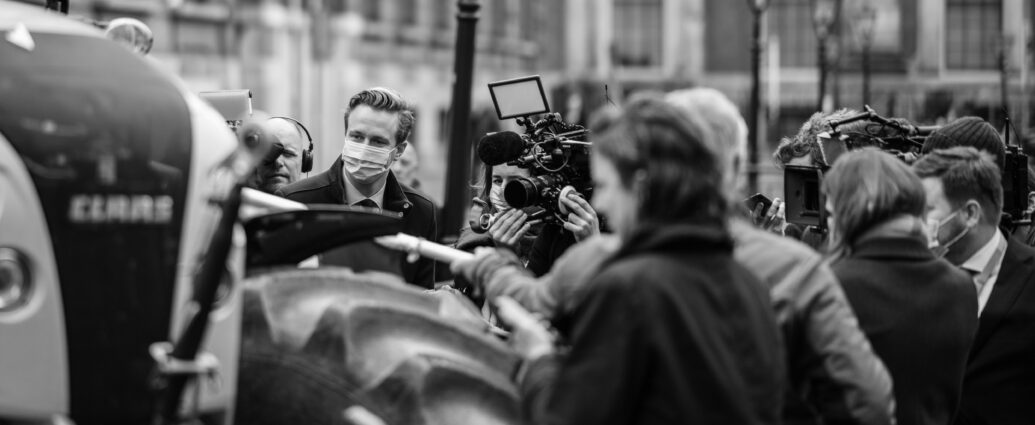Devika Sreejith
Recently, actor and filmmaker Andrew Scott, known for his roles as Hot Priest in Fleabag, Moriarty in Sherlock and for his new movie All Of Us Strangers (2023), faced an awkward and frankly inappropriate moment during a red carpet interview at the BAFTA Film Awards.
BBC Correspondent Colin Paterson asked Scott about fellow Irish actor Barry Keoghan’s prosthetic penis in Saltburn (2023). The incident caused backlash online, leading to the BBC releasing a statement that the question was intended as “light-hearted.”
This is frankly disgusting. Andrew Scott is there to support his multiple nominated film and THIS is what you ask? Then when he looks visibly uncomfortable the guy carried on. Truly horrid. #BAFTAs pic.twitter.com/42VEoBXRQi
— Alex Gilston (@PresenterAlex) February 18, 2024
But this is not an isolated incident. Celebrities are often subjected to inappropriate questions and uncomfortable situations during interviews.
Do Celebrities Have Private Lives?
There is a price to pay for a life in the public eye: paparazzi, online scrutiny and invasive questions are some of the downsides of fame. Celebrities are often forced to forfeit their right to privacy for fans to know the ins and outs of their lives.
However, this is not always the case. Cillian Murphy, for example, is a famously private individual. He rarely talks about himself in interviews and prefers not to be photographed by fans. Dolly Parton is said to wear her wig on screen so that she is unrecognisable without it in public. Taylor Swift has gone to great lengths to maintain her privacy, allegedly travelling inside suitcases to avoid the paparazzi.
Fans love to keep up with their favourite celebrities’ likes, dislikes, relationships and more. Some celebrities voluntarily share this information — Karen Gillan even shared a photo attending couple’s therapy with her husband while shooting Guardians Of The Galaxy Vol. 3 (2023). But what happens when they are pressured to reveal intimate details of their lives?
In honour of Guardians of the Galaxy in theaters Friday, here’s a screenshot of the time I forgot I had scheduled a COUPLES THERAPY session on a day we were shooting. #GuardiansOfTheGalaxyVol3 pic.twitter.com/AdMdkJo2tf
— Karen Gillan (@karengillan) May 3, 2023
How Good Is A ‘Good Scoop’?
“It can be easy to forget that they are real people.”
From a journalistic perspective, the rules surrounding the protection of celebrities’ privacy are quite vague. The most common rebuttal a journalist can receive is an accusation of false information or defamation. Anyone a journalist has written or spoken about can take legal action against them if the information is proven to be false and damaging to their reputation.
But journalists often place public figures in uncomfortable positions to get a closer look into their private lives. Saltburn star Jacob Elordi was recently involved in a police investigation after allegedly assaulting radio producer Joshua Fox in Australia. Why? He reportedly asked Elordi for some of his bathwater as a birthday present for his radio co-host.
Para-social relationships with celebrities can make it easy to forget that they are real people. Britney Spears is an unfortunate example of the cumulative impact of media invasion, including exploitative magazine covers, off-colour jokes about her mental health and constant stalking by paparazzi. In 2007, she eventually broke down in front of the paparazzi, shaving her head and breaking their car windows.
Celebrities are undeniably accompanied by a platform and a degree of privilege. But public figures are still human beings. Scott deserves better than to be asked about his colleague’s penis, Ayo Edebiri and Quinta Brunson deserve better than to be asked about co-star Jeremy Allen White’s Calvin Klein commercial, and Elordi deserves to be remembered for more than the infamous bathtub scene.
Types Of Interviews
Celebrity interviews should be conducted to allow the figures to share details about their recent projects. This could include their working environment, their pride surrounding what they have created and the friendships they have built. The interviews can also help connect the audience with the celebrity, but this depends on the setting. Interviews like ‘Hot Ones’ and Buzzfeed’s ‘Puppy Interviews’ are rather casual and an excellent setting to ask questions about the celebrities’ hobbies, interests, likes and dislikes.
Interviews like the LA Times‘ ‘Actors Roundtable’ provide an environment to learn more about the craft and professional opinions. Red-carpet interviews are somewhere in the middle, we have witty creators like Amelia Dimoldenberg and journalists interviewing celebrities, asking them about their favourite films and which projects they are most excited about. Instead of invading their personal lives, why don’t we invite more cute content like this?
Zendaya for Buzzfeed’s Puppy Interview
pic.twitter.com/RXXkIPEO0A— Film Updates (@FilmUpdates) February 22, 2024
Hopefully, the future of interviews will contain more fun rapports with the interviewee(s), encouraging them to share details on things they are excited about — professional or personal.
READ NEXT:
-
BARBIE OSCARS CONTROVERSY: WERE GERWIG AND ROBBIE REALLY SNUBBED?
-
SHOULD WE BOYCOTT EUROVISION 2024?
-
IS REVENGE PORN TAKEN SERIOUSLY ENOUGH?
Featured image courtesy of Michael Fousert via Unsplash. No changes were made to the image. Image licence found here.

